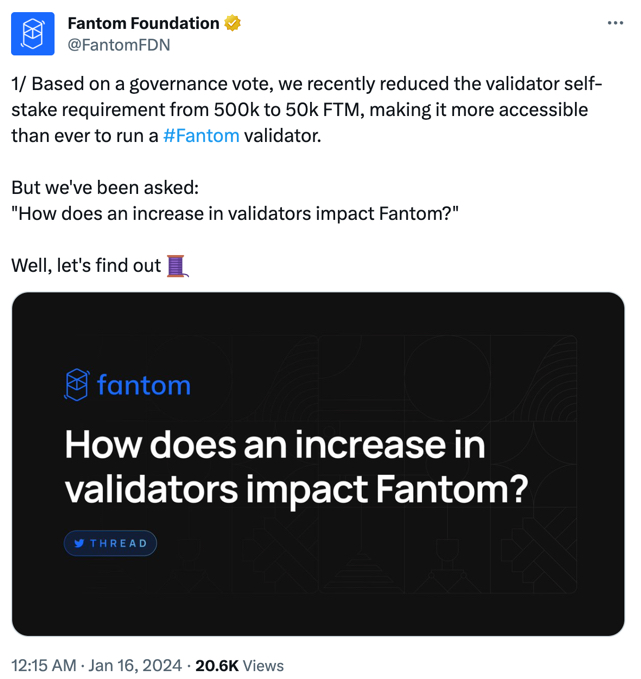Fantom Foundation Slashes Validator Staking Requirement by 90% to Bolster Network Security
2024-01-16 07:05:35The Fantom Foundation cuts validator staking by 90% to enhance security and accessibility after a recent wallet hack.

Image source: CoinMarketCap
The Fantom Foundation, an influential player in the blockchain industry, has taken a major step to enhance its network's security and accessibility. In a recent announcement, the foundation confirmed a dramatic 90% reduction in the self-staking requirement for validators on its primary blockchain, Fantom. This decision, which follows a governance vote concluded in June 2023, brings down the staking threshold from 500,000 FTM to 50,000 FTM. With the current value, this equates to approximately $19,500. This significant change is expected to not only fortify Fantom's security but also to make the role of a validator more attainable than before. The foundation's strategy is to increase the number of validators, thereby making it tougher for malicious actors to compromise the network.

Source: Fantom’s Post
The role of validators in the Fantom network is critical, as they are responsible for processing and bundling transactions, which are then verified through a consensus among at least two-thirds of the network's validators. The foundation anticipates that the increase in validator count will lead to a more rapid submission of transactions across the network, thanks to a larger pool of validators. However, there were concerns that this increase could potentially slow down the network. Addressing these concerns, the Fantom Foundation assured that the network's performance, particularly its 1–2 second time to finality, will remain unaffected as long as the new validators are equipped with high-quality hardware. Furthermore, the foundation clarified that the reduced staking requirement does not pose a security risk. The power of a validator in confirming transactions is proportional to the amount of FTM they have staked, meaning a higher number of validators does not equate to increased vulnerability.
This development is part of Fantom's continuous efforts to improve its platform. The decision to lower the staking requirements has been under consideration since at least February 2022. The recent decision gains particular significance in the context of a security breach three months ago, where the Fantom Foundation's official hot wallet was hacked, resulting in a loss of $550,000. This incident, which constituted less than 1% of the foundation's funds, was followed by the foundation awarding $1.7 million to a security researcher who identified and alerted them to an additional potential risk related to the hack, thereby preventing a much larger potential loss of $170 million. Currently, Fantom is secured by 58 validators, a number considerably lower than its competitors like Ethereum, which boasts over 1.1 million validators. Other platforms like Cardano, Solana, and Avalanche also have a higher number of validators, as per a report citing Messari data from June 2023. This discrepancy in the number of validators highlights the uniqueness of each blockchain platform's approach to network security and governance.
Fantom's initiative is seen as a strategic move to position itself more competitively in the blockchain space. By lowering the barrier to becoming a validator, Fantom is likely to attract a broader range of participants, potentially leading to a more decentralized and robust network. As the blockchain industry continues to evolve, the role of validators and the mechanisms for ensuring network security remain central to the discussion. Fantom's decision to reduce the staking requirement is a significant step in adapting to the changing landscape of blockchain technology and could set a precedent for other platforms. It will be interesting to observe how this change impacts the overall security and efficiency of the Fantom network and how it influences the strategies of other blockchain platforms in managing their validator communities and network security.
Disclaimer: FameEX makes no representations on the accuracy or suitability of any official statements made by the exchange regarding the data in this area or any related financial advice.